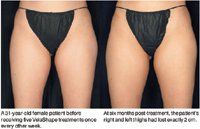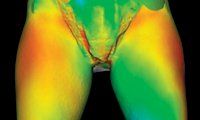- General Dermatology
- Eczema
- Chronic Hand Eczema
- Alopecia
- Aesthetics
- Vitiligo
- COVID-19
- Actinic Keratosis
- Precision Medicine and Biologics
- Rare Disease
- Wound Care
- Rosacea
- Psoriasis
- Psoriatic Arthritis
- Atopic Dermatitis
- Melasma
- NP and PA
- Skin Cancer
- Hidradenitis Suppurativa
- Drug Watch
- Pigmentary Disorders
- Acne
- Pediatric Dermatology
- Practice Management
- Prurigo Nodularis
Article
Noninvasive fat-removal treatments work, but likely won't replace liposuction
Many noninvasive treatments developed to treat unwanted fat show modest results, but they're unlikely to replace tumescent liposuction.

Key Points
National report - Many noninvasive treatments developed to treat unwanted fat show modest results, but they're unlikely to replace tumescent liposuction.



"But we have more work to do before they will come close to replacing liposuction," she says

Zerona study
A low-level diode (635 nm) laser (Zerona, Erchonia) offers temporary benefits, Dr. Butterwick says. "It also involves putting patients on vitamins and supplements, plus drinking lots of water" during a two-week treatment protocol, which naturally encourages weight loss, she says. As such, "The device might be a way to get in shape for a pool party. But because it essentially empties rather than removes fat cells, it won't be a long-lasting result."
In one trial of 635 nm diode laser therapy, patients lost an average of 3.5 inches total from their waists, hips and thighs (Jackson RF, Dedo DD, Roche GC, et al. Lasers Surg Med. 2009;41(10):799-809). However, Dr. Butterwick says, this laser has no large, controlled studies behind it.
In its early pivotal clinical trials as an adjunct to liposuction in which she was an investigator, "We would apply the laser before performing liposuction because we believed the laser appeared to slightly reduce post-liposuction swelling." However, she says, it didn't make a dramatic enough difference here to warrant the extra time as an adjunct to liposuction.
Dr. Brightman says the most recent trial of the Zerona device that was not sponsored by its manufacturer found no statistically significant reductions in five patients treated with the device (Elm C, Wallander ID, Endrizzi B, Zelickson BD. Lasers Surg Med. 2011;43(2):114-121).
Accordingly, she says, "A very important message with all these noninvasive devices - and minimally invasive devices as well - is that you cannot rely solely on the information that a company is presenting. The goal is to have physicians who are highly skilled in these procedures performing clinical trials to determine how to get the best results out of the device. We can then use that information to help choose the most appropriate treatment for our patients."





